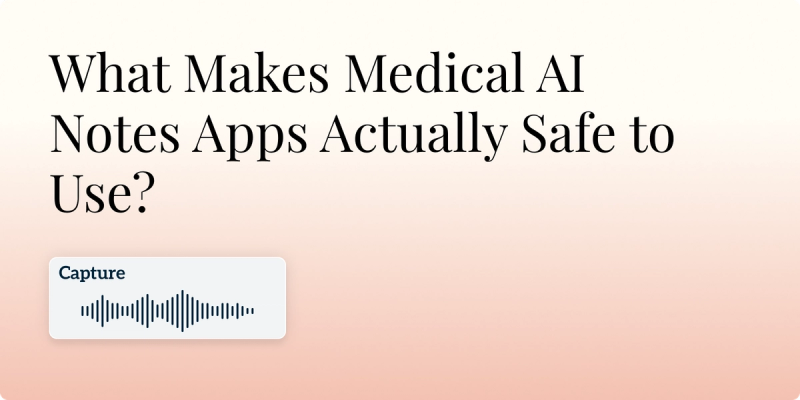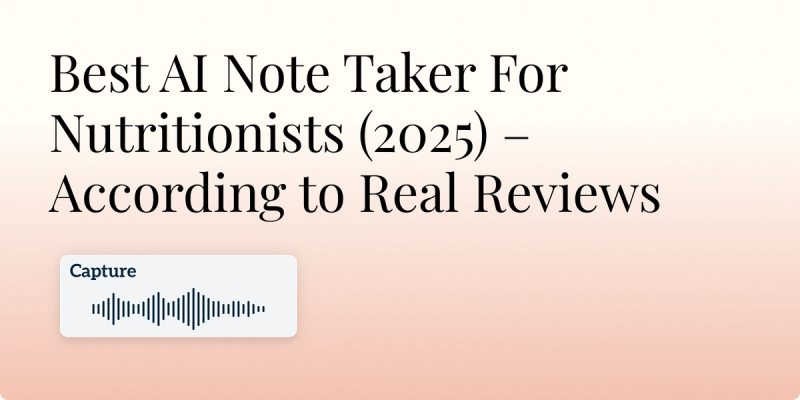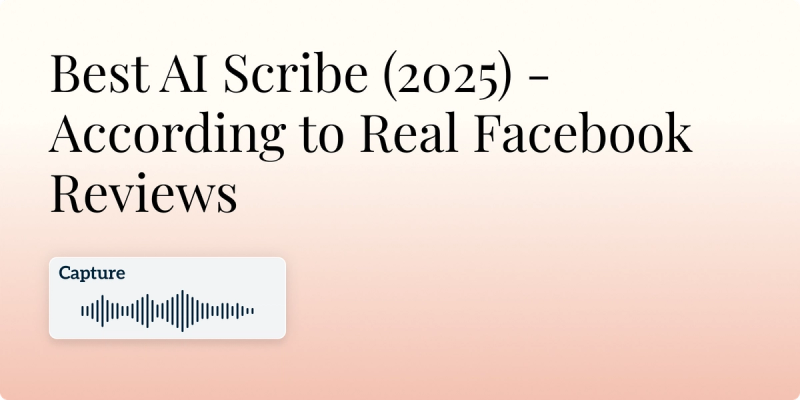
What Makes Medical AI Notes Apps Actually Safe to Use?

The immense administrative burden that clinicians face is a prime target for AI‑powered solutions, such as medical AI notes. While this technology promises incredible efficiency, headlines about data breaches and unethical AI make clinicians justifiably wary. A growing body of research, including investigations into large language models, highlights the potential for these tools to perpetuate bias and compromise data if not designed correctly. So, how can you tell which tools are genuinely safe?
Here is a clear checklist of the features and certifications that distinguish secure, ethical AI notes from potentially risky chatbots.
HIPAA Compliance and the BAA for Medical AI Notes Apps
Why HIPAA Compliance Is The Bare Minimum For Medical AI Notes
When evaluating any medical AI notes tool, AI Notes HIPAA Compliance is the first and most critical box to check. The Health Insurance Portability and Accountability Act set the national standard for protecting sensitive patient data or PHI.
For an AI app, this means every step of its operation, from the moment it receives audio to when it stores the final note, must be designed to protect PHI. Using a tool that isn't explicitly designed for healthcare is a liability you wouldn't want to risk.
A 2024 study emphasised that while AI offers advantageous support, standardized regulations and government actions are necessary to protect healthcare practitioners from being held accountable for errors caused by AI.
The Business Associate Agreement (BAA):
A vendor claiming to be HIPAA compliant is simply not enough. The true test is their willingness to sign a Business Associate Agreement (BAA). This isn't just a formality; it's a legally binding contract that holds the vendor financially and legally responsible for protecting your patients' data. It mandates how they handle, store, and transmit PHI and outlines the procedures they must follow in the event of a breach.
Technical Precaution: How Data Is Handled and Stored for Medical AI Notes
Encryption In Transit And At Rest: What Exactly Does This Mean For Safety?
Legal agreements are essential, but they must be backed by strong technical measures. The first thing to look for is end‑to‑end encryption. This means your patients' data is encrypted on your device before it's ever sent over the internet and remains encrypted while stored on the vendor’s servers.
Look for standard industry protocols like AES-256 encryption and TLS 1.2+ for data transfer. This ensures that even in the unlikely event of a data interception, the information would be completely unreadable and useless to hackers.
Data Storage and Processing: Are Servers HIPAA-Compliant?
Where your data is stored matters. A secure AI scribe uses dedicated, secure servers from reputable providers. It is imperative that you ask: Is patient data used to train the AI model?
The most ethical and secure practice is for vendors to train their models on fully anonymized, non‑identifiable data or not to use client data for training at all. Your patients’ intimate therapy session details should never become fodder for improving a public AI.
For a look at tools that prioritize these security features, see our review of the best HIPAA-compliant notes tools.
The Human Factor: Clinician-in-the-Loop Model
Why The Safest AI Doesn't Replace Your Clinical Judgement.
True safe AI medical documentation requires a collaborative relationship. The table below outlines the distinct responsibilities of the AI and the clinician, highlighting why human is the non‑negotiable key to safety and AI Notes HIPAA compliance.
The AI’s Role (Assistant) | The Clinician's Role (Expert) | How This Ensures Safety and Quality |
|---|---|---|
Generates a preliminary draft from audio | Reviews and finalizes notes | Catches errors to ensure clinical accuracy. |
Handles transcription and initial structuring | Applies clinical judgement | Prevents misinterpretation of non-verbal cues or sarcasm |
Suggest potential key topics | Personalizes the note | Ensures notes are specific and relevant to the patient |
Process data quickly and efficiently | Sign the note as the legal author | Maintains ethical and legal integrity. |
For a practical example of how this partnership works in practice, explore our guide to AI-assisted SOAP notes
Transparency: What to Ask Before You Buy
Before you commit to any platform, due diligence is your best defense. A trustworthy vendor will be transparent and welcome these questions. Here are the five essential questions:
- Will you sign my BAA?
- How is my and my patients' data encrypted?
- Is your AI trained on patient data?
- Can you provide a SOC 2 Type II report?
- What is your data deletion policy?
Bias and Clinical Safety of AI in Medical Notes
How Safe AI Mitigates Bias In Medical Documentation
For a medical AI notes tool to be truly safe, its responsibility must extend beyond protecting data to ensuring the data's accuracy. AI models can inadvertently perpetuate and amplify societal biases present in their training data, leading to serious clinical risks.
Ethical vendors actively work to mitigate this by the following:
- Conducting bias audits: they test their models for performance disparities across different racial, gender, ethnic and age groups.
- Using diverse training data: they prioritize training their models on diverse datasets that represent the broad spectrum of human language and cultural expressions.
- Implementing ‘fairness-aware’ algorithms: some employ these technical methods designed to correct for identified biases in the model's outputs actively.
Conclusion
So, determining what makes a medical AI notes app actually safe to use comes down to a triad of non‑negotiables: Legal and HIPAA compliance, technical precautions and human oversight. The integration of these three elements ultimately creates a truly secure and ethical framework for implementation.
By choosing a platform built on this foundation, you can leverage AI to alleviate administrative burdens and enhance your practice's efficiency. This allows you to utilize the power of technology as a tool that amplifies your expertise, ensuring that the focus remains where it belongs: on delivering exceptional care. Ready to experience a platform built on this foundation of safety? Explore how Twofold’s secure AI documentation can help you save time without compromise.
Frequently Asked Questions
ABOUT THE AUTHOR
Dr. Eli Neimark
Licensed Medical Doctor
Reduce burnout,
improve patient care.
Join thousands of clinicians already using AI to become more efficient.

Best AI Note Taker For Nutritionists (2025) – According to Real Reddit Reviews
Dietitians, cut charting time in half. See which 7 HIPAA‑ready AI scribes Reddit RDs love (and loathe) and pick the right nutrition‑focused tool for 2025.

The Best AI Scribe in 2025 - According to Real Facebook Reviews
We read real Facebook reviews to rank the best AI scribe tools of 2025. See authentic quotes, pros & cons, and find your recommended AI scribe fast.

How to Write High Quality Clinic Notes: 5 Easy Steps
Learn how to write clear, comprehensive, and compliant clinic notes in five easy steps. Perfect for healthcare teams, medical practices, and mental health therapists.

